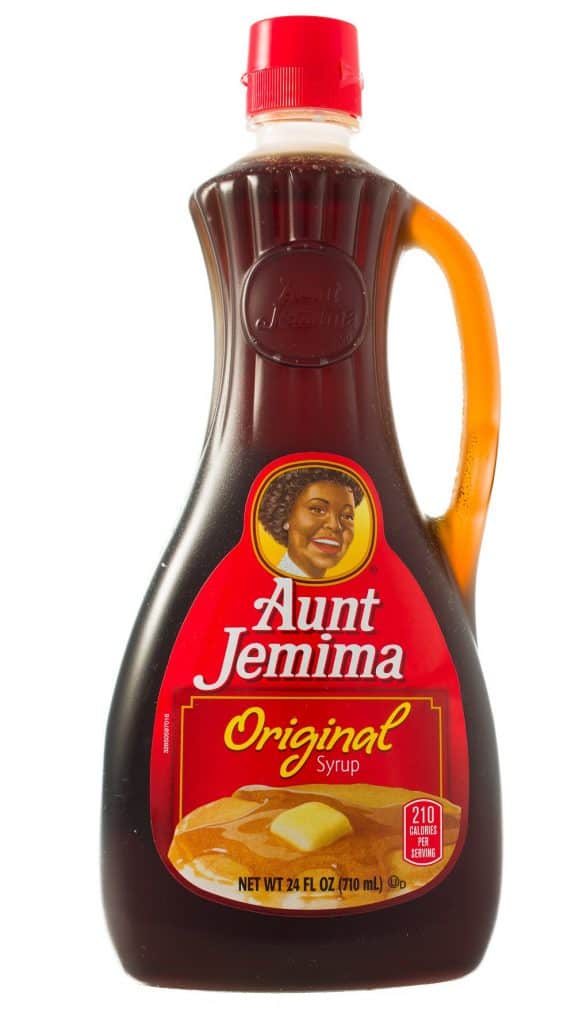Aunt Jemima is a traditional American brand that popularly produces pancake mixes and syrups. The official website lists that the brand began in 1889 as a mill that produced flour, cornmeal, and their famous pancake mix. A favored partner to pancakes, the brand is also known for its pancake syrups. While there are different flavors to choose from, Aunt Jemima is still known for its Original Syrup.
Many people would consider Aunt Jemima syrup to be perfectly vegan since the products do not contain any obvious animal product or derivative. However, there are factors for some to consider. Firstly, Aunt Jemima Syrup does contain a few ingredients that some refer to as gray area ingredients – these are natural flavors and artificial coloring agents. Secondly, the brand has been associated with a racist history that can turn away some ethical vegans.
Table of Contents
Is Aunt Jemima Syrup Vegan?
Aunt Jemima syrups do not contain ingredients that are blatantly derived from animals such as meat, dairy, and so on. Thus, many vegans would consider that the syrup brand is perfectly vegan.
However, there are some ingredients that would make some vegans worry. While not blatantly animal-derived, there are some ingredients that are relatively harder to ascertain if they are vegan or not – these are called gray area ingredients. Specifically, Aunt Jemima syrup contains two of these gray area ingredients: natural flavors and artificial coloring agents.

Firstly, natural flavors are a common flavoring agent that can be found in many food products. This is considered a gray area ingredient because the term can contain both plant and animal derivatives under its definition. Thus, some vegans avoid such ingredients to stay on the safe side.
Secondly, artificial coloring agents pose an ethical issue. While they do not contain any animal product or derivative, these substances have been tested on animals. As a stand against animal exploitation, many vegans also choose to avoid products that have been tested on animals.
The last issue with Aunt Jemima is not related to the ingredients the products use. Some vegans might not be happy with the brand knowing that the brand is affiliated with a racist history. The name and the logo of Aunt Jemima are based on a minstrel performer, and the branding of Aunt Jemima has long been associated with a racist stereotype.
Aunt Jemima Syrup Ingredients List
The list of ingredients of Aunt Jemima Original Syrup includes (1): corn syrup, high fructose corn syrup, water, cellulose gum, caramel color, salt, natural and artificial flavor, sodium benzoate and sorbic acid (preservatives), sodium hexametaphosphate.
Aside from the Original Syrup, the syrup brand also offers other variants such as the Lite, Butter Rich, Butter Lite, Country Rich, and the Cap’n Crunch’s Ocean Blue Artificially Maple Flavored Syrup (2). The different varieties of Aunt Jemima Syrup would have relatively similar ingredients. This article will go over the varieties listed on the website as well.
Natural Flavors
Natural flavors are common ingredients that can be found in many food and beverage products. It is an important ingredient that primarily imparts flavor instead of having a relatively more functional role in the product. As the name suggests, natural flavors are substances that are obtained from natural sources – a stark contrast to artificial flavors that are made of synthetic substances. Although this ingredient is derived from nature, vegans are wary of the uncertainty surrounding the definition of natural flavors. Specifically, the FDA defines natural flavors as (3):
“The essential oil, oleoresin, essence or extractive, protein hydrolysate, distillate, or any product of roasting, heating or enzymolysis, which contains the flavoring constituents derived from a spice, fruit or fruit juice, vegetable or vegetable juice, edible yeast, herb, bark, bud, root, leaf or similar plant material, meat, seafood, poultry, eggs, dairy products, or fermentation products thereof, whose significant function in food is flavoring rather than nutritional.”
FDA.gov
Since vegans have to make sure that the food they are consuming is devoid of animal products, natural flavors pose an obstacle towards a clear answer since the umbrella definition of the ingredient implies that natural flavors can contain both animal- and plant-derived substances. The uncertainty with natural flavors is the reason why many consider the ingredient as a gray area ingredient. Ultimately, many vegans choose to avoid products with natural flavors as a precaution.
All the Aunt Jemima Syrup flavors contain natural flavors.
Food Coloring Agents
While food consumption is typically associated with the sense of taste and smell, visual perception is also an integral part of the consumption experience. Hence, many food and beverage companies would actively manipulate the appearance of their products through the use of food coloring agents. Many kinds of food coloring agents are used in the food industry. However, vegans have concerns with products that contain artificial coloring agents.
As opposed to natural coloring agents that use substances from nature, artificial coloring agents are substances that are synthesized in laboratories from crude materials. Since these substances are synthesized from rudimentary substrates, artificial coloring agents are certainly devoid of animal products. Thus, many dietary vegans are perfectly fine with products that contain artificial coloring agents. However, the issue that arises from artificial coloring agents is ethical in nature.
Since artificial coloring agents are synthesized in laboratories, it is important that these substances are tested for safety. Various food safety authorities require these substances to undergo numerous safety tests to be certified for human consumption. While these tests are indeed important, the problem with artificial coloring agents is that they have been tested on animals.
The use of animal models in safety testing is considered to be a highly unethical practice due to the inhumane treatment of the animals involved. The animals involved are either killed by the treatment, or killed for data gathering. The practice of animal testing is especially unethical when modern alternatives can effectively be used instead such as the use of cell models or in silico studies (i.e., the use of computer modeling or algorithms).
Most of the Aunt Jemima Syrup flavors do not contain artificial coloring agents. Instead, they mostly contain caramel color – a perfectly vegan food coloring agent. However, the Cap’n Crunch’s Ocean Blue Artificially Maple Flavored Syrup contains blue 1 (4). Also known as Brilliant Blue FCF, blue 1 has been documented to be tested on a wide variety of animals including mice, rats, dogs, cats, and so on (5).
Racism Controversy
One big issue that surrounds the Aunt Jemima brand is its racist history (6). Specifically, the name and logo of the syrup brand come from “Old Aunt Jemima,” a song from a minstrel show performer that was reportedly sung by slaves. With the brand debuting in 1890, the official website states that the brand is based on Nancy Green – a cook and missionary worker who was born into slavery.
As a strategic move to denounce this racist past, the Aunt Jemima brand was officially renamed the Pearl Milling Company in 2021. The brand has also pledged to donate $5 million dollars over the course of the next five years in support of the black community.
However, the association with slavery and exploitation can be enough to turn away some members from the vegan community. While vegans are primarily known to support animal rights, ethical vegans also stand for human rights. Thus, these ethical vegans also abstain from products that are associated with human rights exploitation such as unfair wages, child labor, and racist tendencies.
References
1. https://www.pearlmillingcompany.com/
2. https://www.pearlmillingcompany.com/
3. https://www.accessdata.fda.gov/
4. https://www.pearlmillingcompany.com/
Featured Image Credit: JimLambert / Depositphotos.com




